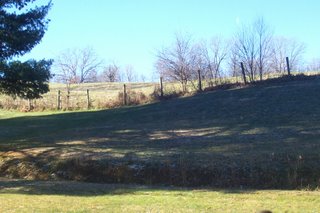on site research
I visited the place where my novel is set--Logan, Ohio--over the weekend. My real reason was for my grandson's first birthday, and I didn't do any actual research. But I did spend some time dreaming, gazing out the back window, which looks out on a hill.
There's a hill that rises away from the back of the house, and some immense pine trees that look ancient (but probably aren't because pines grow quite quickly), and some woods at the back of the field, and a fence that comes across diagonally. It's not an exotic view, probably pretty typical in Logan. But whenever I look out of the window (which I do fairly often, because it's the window of the room I sleep in there), I start to think of the farm that once occupied the place where the ranch house is now, and how the farm stretched from one hill and over across another, all the way maybe to the family cemetery that's around the corner of the road.
The farm was broken up probably in the '70s, part of it given to a daughter when she got married. The long years of the farm, growing crops and raising cows on somewhat unforgiving land--it's hilly in Logan, and the topsoil isn't terribly deep--sometimes I feel as if all that labor is still in the soil, and that when you stand on the hill back of the house, as I did with my grandson yesterday, you can feel the chaos and turmoil and sweat of that work rising out of the ground.

We stood on the hill and I told him things like "There are the pine trees. This is the barn." I was holding him because he learned to walk in the winter and all his walking has been done inside. He didn't like the grass--it probably seemed treacherously uneven and soft to him. We stood on the hill and I told him, "Here is the sky. That is a fence," and he listened, either to me or to the wind.
There's a hill that rises away from the back of the house, and some immense pine trees that look ancient (but probably aren't because pines grow quite quickly), and some woods at the back of the field, and a fence that comes across diagonally. It's not an exotic view, probably pretty typical in Logan. But whenever I look out of the window (which I do fairly often, because it's the window of the room I sleep in there), I start to think of the farm that once occupied the place where the ranch house is now, and how the farm stretched from one hill and over across another, all the way maybe to the family cemetery that's around the corner of the road.
The farm was broken up probably in the '70s, part of it given to a daughter when she got married. The long years of the farm, growing crops and raising cows on somewhat unforgiving land--it's hilly in Logan, and the topsoil isn't terribly deep--sometimes I feel as if all that labor is still in the soil, and that when you stand on the hill back of the house, as I did with my grandson yesterday, you can feel the chaos and turmoil and sweat of that work rising out of the ground.

We stood on the hill and I told him things like "There are the pine trees. This is the barn." I was holding him because he learned to walk in the winter and all his walking has been done inside. He didn't like the grass--it probably seemed treacherously uneven and soft to him. We stood on the hill and I told him, "Here is the sky. That is a fence," and he listened, either to me or to the wind.


4 Comments:
that was a great little story. i love little kids and the really important things you tell them and they just look at you
im sure you didnt do any hard research, but did you get that feeling when you know youre in one place and certainly not another? im sure just looking out of the window was good for the book somehow
L,
Santa
I wouldnt know how to write an exotic setting. The simplest things do it for me: a hill, a fence between two trees, a certain kind of gray day, and of course winter which I really have to stop writing about.
Remember how V held up her feet when we tried to dangle them in the lake? I guess the grass felt pretty exotic to C.
My grandmother grew up on a farm. Now all we have are fading photographs and the language she passed on. It was peppered with 'farmy' expressions, such as 'fit as a Mallee bull', meaning in very good health.
Post a Comment
<< Home